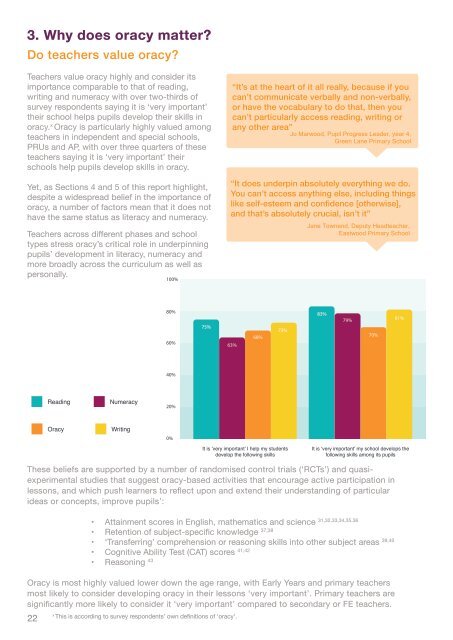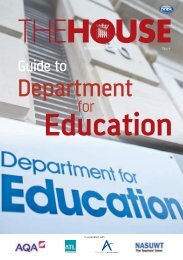Oracy
2fcBkno
2fcBkno
You also want an ePaper? Increase the reach of your titles
YUMPU automatically turns print PDFs into web optimized ePapers that Google loves.
%<br />
73%<br />
3. Why does oracy matter?<br />
Do teachers value oracy?<br />
Teachers value oracy highly and consider its<br />
importance comparable to that of reading,<br />
writing and numeracy with over two-thirds of<br />
survey respondents saying it is ‘very important’<br />
their school helps pupils develop their skills in<br />
oracy. x <strong>Oracy</strong> is particularly highly valued among<br />
teachers in independent and special schools,<br />
PRUs and AP, with over three quarters of these<br />
teachers saying it is ‘very important’ their<br />
schools help pupils develop skills in oracy.<br />
Yet, as Sections 4 and 5 of this report highlight,<br />
despite a widespread belief in the importance of<br />
oracy, a number of factors mean that it does not<br />
83%<br />
have the same status as literacy and numeracy.<br />
75%<br />
Teachers across different phases 73% and school<br />
83%<br />
68%<br />
types stress oracy’s critical role in underpinning<br />
63%<br />
79%<br />
81%<br />
pupils’ development in literacy, numeracy and<br />
more broadly across the 70% curriculum as well as<br />
personally.<br />
100%<br />
79%<br />
“It’s at the heart of it all really, because if you<br />
can’t communicate verbally and non-verbally,<br />
or have the vocabulary to do that, then you<br />
can’t particularly access reading, writing or<br />
any other area”<br />
Jo Marwood, Pupil Progress Leader, year 4,<br />
Green Lane Primary School<br />
“It does underpin absolutely everything we do.<br />
You can’t access anything else, including things<br />
like self-esteem and confidence [otherwise],<br />
and that’s absolutely crucial, isn’t it”<br />
70%<br />
81%<br />
Jane Townend, Deputy Headteacher,<br />
Eastwood Primary School<br />
80%<br />
60%<br />
75%<br />
63%<br />
68%<br />
73%<br />
83%<br />
79%<br />
70%<br />
81%<br />
It is ‘very important’ I help my students<br />
develop the following skills<br />
40% It is ‘very important’ my school develops the<br />
following skills among its pupils<br />
ents<br />
It is Reading ‘very important’ my school Numeracy develops the <strong>Oracy</strong> Writing<br />
20%<br />
following skills among its pupils<br />
racy <strong>Oracy</strong> Writing<br />
0%<br />
It is ‘very important’ I help my students<br />
develop the following skills<br />
It is ‘very important’ my school develops the<br />
following skills among its pupils<br />
These beliefs are supported by a number of randomised Reading control Numeracy trials (‘RCTs’) <strong>Oracy</strong> and quasiexperimental<br />
studies that suggest oracy-based activities that encourage active participation in<br />
Writing<br />
lessons, and which push learners to reflect upon and extend their understanding of particular<br />
ideas or concepts, improve pupils’:<br />
22<br />
• Attainment scores in English, mathematics and science 31,32,33,34,35,36<br />
• Retention of subject-specific knowledge 37,38<br />
• ‘Transferring’ comprehension or reasoning skills into other subject areas 39,40<br />
• Cognitive Ability Test (CAT) scores 41,42<br />
• Reasoning 43<br />
<strong>Oracy</strong> is most highly valued lower down the age range, with Early Years and primary teachers<br />
most likely to consider developing oracy in their lessons ‘very important’. Primary teachers are<br />
significantly more likely to consider it ‘very important’ compared to secondary or FE teachers.<br />
x<br />
This is according to survey respondents’ own definitions of ‘oracy’.




